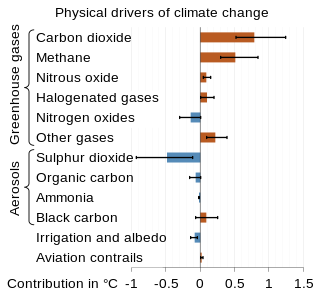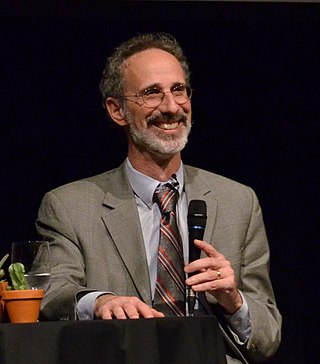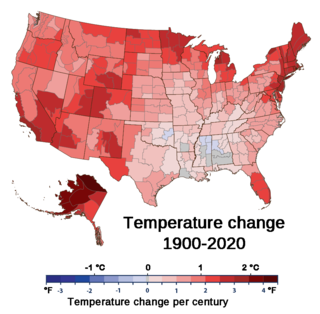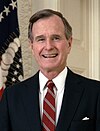Related Research Articles

The scientific community has been investigating the causes of climate change for decades. After thousands of studies, it came to a consensus, where it is "unequivocal that human influence has warmed the atmosphere, ocean and land since pre-industrial times." This consensus is supported by around 200 scientific organizations worldwide, The dominant role in this climate change has been played by the direct emissions of carbon dioxide from the burning of fossil fuels. Indirect CO2 emissions from land use change, and the emissions of methane, nitrous oxide and other greenhouse gases play major supporting roles.

The National Academies of Sciences, Engineering, and Medicine (NASEM), also known as the National Academies, is a congressionally chartered organization that serves as the collective scientific national academy of the United States. The name is used interchangeably in two senses: (1) as an umbrella term or parent organization for its three sub-divisions that operate as quasi-independent honorific learned society member organizations known as the National Academy of Sciences (NAS), the National Academy of Engineering (NAE), and the National Academy of Medicine (NAM); and (2) as the brand for studies and reports issued by the unified operating arm of the three academies originally known as the National Research Council (NRC). The National Academies also serve as public policy advisors, research institutes, think tanks, and public administration consultants on issues of public importance or on request by the government.

The National Oceanic and Atmospheric Administration is a scientific and regulatory agency within the Washington, D.C.–based United States Department of Commerce, headquartered in Silver Spring, Maryland.

There is a nearly unanimous scientific consensus that the Earth has been consistently warming since the start of the Industrial Revolution, that the rate of recent warming is largely unprecedented, and that this warming is mainly the result of a rapid increase in atmospheric carbon dioxide (CO2) caused by human activities. The human activities causing this warming include fossil fuel combustion, cement production, and land use changes such as deforestation, with a significant supporting role from the other greenhouse gases such as methane and nitrous oxide. This human role in climate change is considered "unequivocal" and "incontrovertible".

Peter H. Gleick is an American scientist working on issues related to the environment. He works at the Pacific Institute in Oakland, California, which he co-founded in 1987. In 2003 he was awarded a MacArthur Fellowship for his work on water resources. Among the issues he has addressed are conflicts over water resources, water and climate change, development, and human health.

The Global Change Research Act 1990 is a United States law requiring research into global warming and related issues. It requires a report to Congress every four years on the environmental, economic, health and safety consequences of climate change.
The Climate Change Science Program (CCSP) was the program responsible for coordinating and integrating research on global warming by U.S. government agencies from February 2002 to June 2009. Toward the end of that period, CCSP issued 21 separate climate assessment reports that addressed climate observations, changes in the atmosphere, expected climate change, impacts and adaptation, and risk management issues. Shortly after President Obama took office, the program's name was changed to U.S. Global Change Research Program (USGCRP) which was also the program's name before 2002. Nevertheless, the Obama Administration generally embraced the CCSP products as sound science providing a basis for climate policy. Because those reports were mostly issued after the Fourth Assessment Report of the Intergovernmental Panel on Climate Change (IPCC), and in some cases focused specifically on the United States, they were generally viewed within the United States as having an importance and scientific credibility comparable to the IPCC assessments for the first few years of the Obama Administration.
Frederick Steven "Rick" Piltz was a former senior associate in the U.S. Climate Change Science Program. In March 2005, he resigned over political interference in the program's climate change reports. In June 2005, the New York Times exposed the role of Philip Cooney in editing government documents on climate change to create an appearance of scientific uncertainty. A former lobbyist with the American Petroleum Institute, Cooney resigned and days later took a job at Exxon Mobil.

Willard Anthony Watts is an American blogger who runs Watts Up With That?, a climate change denial blog that opposes the scientific consensus on climate change. A former television meteorologist and current radio meteorologist, he is also founder of the Surface Stations project, a volunteer initiative to document the condition of U.S. weather stations. The Heartland Institute helped fund some of Watts' projects, including publishing a report on the Surface Stations project, and invited him to be a paid speaker at its International Conference on Climate Change from 2008 to 2014.

Roger S. Pulwarty is a scientist from Trinidad and Tobago and contributed to the work of the Intergovernmental Panel on Climate Change (IPCC). Pulwarty is the Senior Scientist in the National Oceanic and Atmospheric Administration (NOAA) Physical Sciences Laboratory in Boulder, Colorado.

Climate change has led to the United States warming by 2.6 °F since 1970. The climate of the United States is shifting in ways that are widespread and varied between regions. From 2010 to 2019, the United States experienced its hottest decade on record. Extreme weather events, invasive species, floods and droughts are increasing. Climate change's impacts on tropical cyclones and sea level rise also affects regions of the country.
The United States Global Change Research Program (USGCRP) coordinates and integrates federal research on changes in the global environment and their implications for society. The program began as a presidential initiative in 1989 and was codified by Congress through the Global Change Research Act of 1990, which called for "a comprehensive and integrated United States research program which will assist the Nation and the world to understand, assess, predict, and respond to human-induced and natural processes of global change."

An atmospheric river (AR) is a narrow corridor or filament of concentrated moisture in the atmosphere. Other names for this phenomenon are tropical plume, tropical connection, moisture plume, water vapor surge, and cloud band.
Michael Calvin MacCracken, has been chief scientist for climate change programs with the Climate Institute in Washington, D.C., since 2002; he was also elected to its board of directors in 2006.
Richard B. (Ricky) Rood is a professor of Climate and Space Sciences and Engineering at the University of Michigan in Ann Arbor. Prior to 2005, he held several leadership positions at NASA’s Goddard Space Flight Center. He has more than 100 academic publications.

Susan K. Avery is an American atmospheric physicist and President Emerita of the Woods Hole Oceanographic Institution (WHOI) in Massachusetts, where she led the marine science and engineering research organization from 2008–2015. She was the ninth president and director and the first woman to hold the leadership role at WHOI. She is Professor Emerita at the University of Colorado, Boulder (UCB), where she served on the faculty from 1982–2008. While at UCB she also served in various administrative positions, including director of the Cooperative Institute for Research in Environmental Sciences (CIRES), a 550-member collaborative institute between UCB and the National Oceanic and Atmospheric Administration (NOAA) (1994-2004); and interim positions (2004-2007) as vice chancellor for research and dean of the graduate school, and provost and executive vice chancellor for academic affairs. Currently she is a senior fellow at the Consortium for Ocean Leadership in Washington, D.C.
The U.S. Global Change Research Program (USGCRP) develops and curates the Global Change Information System (GCIS) to establish "data interfaces and interoperable repositories of climate and global change data which can be easily and efficiently accessed, integrated with other data sets, maintained and expanded over time." The initial focus of GCIS is to support the United States Third National Climate Assessment (NCA3), which is to publish reports that enhance the transparency and ability of decision-makers to understand the conclusions and use of the underlying data for their own purposes.
Fourth National Climate Assessment (NCA4) 2017/2018 is a 1,500 page two-part congressionally mandated report by the U.S. Global Change Research Program (USGCRP)—the first of its kind by the Trump administration, who released the report on November 23, 2018. The climate assessment process, with a report to be submitted to Congress every four years, is mandated by law through the Global Change Research Act of 1990. The report, which took two years to complete, is the fourth in a series of National Climate Assessments (NCA) which included NCA1 (2000), NCA2 (2009), and NCA3 (2014).
Shelby G. Tilford was an American atmospheric spectroscopist, Earth scientist, and science program administrator. He retired in 1994 after a long career with the National Aeronautics and Space Administration, most recently serving as the Acting Associate Administrator of NASA's Office of Mission to Planet Earth. He is recognized as one of the main initiators of the Earth system science concept and NASA's Mission to Planet Earth program, which represented NASA's contribution to the U.S. Global Change Research Program (USGCRP).
Maria Carmen de Mello Lemos is Professor of Environment and Sustainability and co-director of the Great Lakes Integrated Sciences and Assessments Center at the University of Michigan, Ann Arbor, and Senior Policy Scholar at the Udall Center for the Study of Public Policy at the University of Arizona. Lemos is an established climate policy analyst whose research focuses primarily on environmental public policymaking in Latin America and the U.S., especially related to climate change adaptation and adaptive capacity building.
References
- 1 2 Preparing the Nation for Change: Introduction to the National Climate Assesement (PDF), Washington, D.C: U.S. Global Change Research Program, 2013, retrieved May 9, 2014
- ↑ Global Change Research Act of 1990, Public Law 101-606(11/16/90) 104 Stat. 3096-3104, 1990, archived from the original on February 18, 2013
- ↑ Hollings, Ernest F. (1990), Global Change Research Act of 1990, Bill Summary & Status 101st Congress (1989 - 1990) S.169
- ↑ Staudt, A. C.; Cloyd, E. T.; Baglin, C. (July 31, 2012), "NCAnet: Building a Network of Networks to Support the National Climate Assessment", AGU Fall Meeting Abstracts, 2012, NCAnet: GC11C–1019, Bibcode:2012AGUFMGC11C1019S , retrieved May 9, 2014
- 1 2 3 Climate Change Impacts on the United States: the Potential Consequences of Climate Variability and Change (PDF), The First National Climate Assessment, 2000, retrieved May 5, 2014
- 1 2 3 Previous Assessments, Washington, D.C: U.S. Global Change Research Program, n.d., retrieved May 5, 2014
- ↑ Our Changing Climate, Washington, D.C: U.S. Global Change Research Program, 2013, retrieved May 5, 2014
- ↑ National Climate Assessment (NCA) Engagement Strategy (PDF), Washington, DC: USGCRP, May 20, 2011, p. 27, retrieved May 9, 2014
- ↑ What We Do: Assess the U.S. Climate, Washington, DC: USGCRP, n.d., retrieved May 9, 2014
- ↑ The President's Climate Action Plan (PDF), Washington, DC: Executive Office of the President, June 2013, retrieved May 9, 2014
- ↑ "Fifth National Climate Assessment". GlobalChange.gov. Retrieved 2020-11-12.
- ↑ Eilperin, Juliet (August 20, 2017). "The Trump administration just disbanded a federal advisory committee on climate change". Washington Post .
- ↑ Global Change Act, Washington, DC: USCCRP, n.d., retrieved May 10, 2014
- ↑ National Climate Assessment and Development Advisory Committee, Washington, DC: USCCRP, n.d., retrieved May 10, 2014
- ↑ Eilperin, Juliet (August 20, 2017). "The Trump administration just disbanded a federal advisory committee on climate change". Washington Post. Retrieved 14 September 2017.
- ↑ US National Assessment of the Potential Consequences of Climate Variability and Change Charge for the National Assessment Synthesis Team, Washington, DC: USCCRP, January 27, 1998, retrieved May 8, 2014
- 1 2 Joyce, Linda, ed. (2008), Climate Change Assessments, Fort Collins, CO.: United States Forest Service/Climate Change Resource Center (CCRC), retrieved May 9, 2014
- ↑ "GlobalChange.gov". GlobalChange.gov. Retrieved 12 April 2018.
- ↑ "Appendix I - Biographical Sketches of NAST Members" (PDF), National Assessment, GCRIO, n.d., archived from the original (PDF) on December 4, 2010, retrieved May 9, 2014
- ↑ Assessments, Washington, DC: USCCRP, n.d.
- ↑ Global Climate Change Impacts in the United States, Washington, DC: USCCRP, 2009
- ↑ Full Report, Washington, D.C: U.S. Global Change Research Program, 2013, retrieved May 5, 2014
- ↑ Rice, Doyle (6 May 2014). "Federal report gauges U.S. impacts of global warming". USA Today . Retrieved 6 May 2014.
- ↑ "National Climate Assessment and Development Advisory Committee - GlobalChange.gov". globalchange.gov. Retrieved 12 April 2018.
- ↑ Colleen McCain Nelson; Alicia Mundy (5 May 2014). "Obama Intensifies Focus on Climate With New Assessment Report". Wall Street Journal . Retrieved 6 May 2014.
- ↑ "Third National Climate Assessment" . Retrieved 25 June 2014.
- ↑ Staudt, A. C.; Cloyd, E. T.; Baglin, C. (n.d.), "NCAnet: Building a network of networks to support the National Climate Assessment", AGU Fall Meeting Abstracts, 2012, USGCRP: GC11C–1019, Bibcode:2012AGUFMGC11C1019S , retrieved May 9, 2014
- ↑ National Oceanic and Atmospheric Administration (NOAA) (April 13, 2014), NCAnet: Building a Network of Networks in Support of the National Climate Assessment (NCA), Federal Register , retrieved May 9, 2014
- 1 2 Wehner, M. F.; Arnold, J. R.; Knutson, T.; Kunkel, K. E.; LeGrande, A. N. (2017). Wuebbles, D. J.; Fahey, D. W.; Hibbard, K. A.; Dokken, D. J.; Stewart, B. C.; Maycock, T. K. (eds.). Droughts, Floods, and Wildfires (Report). Climate Science Special Report: Fourth National Climate Assessment. Vol. 1. Washington, DC: U.S. Global Change Research Program. pp. 231–256. doi: 10.7930/J0CJ8BNN .
- 1 2 Wuebbles, D. J.; Fahey, D. W.; Hibbard, K. A.; Dokken, D. J.; Stewart, B. C.; Maycock, T. K., eds. (October 2017). Climate Science Special Report (CSSR) (PDF) (Report). Fourth National Climate Assessment. Vol. 1. Washington, DC: U.S. Global Change Research Program. p. 470. doi:10.7930/J0J964J6.
- 1 2 3 Leggett, Jane A. (February 1, 2018). Evolving Assessments of Human and Natural Contributions to Climate Change (PDF) (Report). Congressional Research Service (CRS). p. 22. Retrieved November 23, 2018.
This CRS report provides context for the Administration's Climate Science Special Report (October 2017) by tracing the evolution of scientific understanding and confidence regarding the drivers of recent global climate change.
- 1 2 Impacts, Risks, and Adaptation in the United States (Report). National Climate Assessment. Vol. 2. November 23, 2018. Retrieved November 24, 2018.
- ↑ "Climate Science Special Report (CSSR) Executive Summary". National Oceanic and Atmospheric Administration (NOAA). 2017. Retrieved November 23, 2018.
- ↑ "New federal climate assessment for U.S. released: Report highlights impacts, risks and adaptations to climate change". National Oceanic and Atmospheric Administration (NOAA). November 23, 2018. Retrieved November 23, 2018.
- ↑ "US Government Agencies Participating in the USGCRP". Agencies. USGCRP. 20 October 2008. Retrieved November 23, 2018.
- ↑ Christensen, Jen; Nedelman, Michael (November 23, 2018). "Climate change will shrink US economy and kill thousands, government report warns". CNN. Retrieved November 23, 2018.
- ↑ Fifth National Climate Assessment , U.S. Global Change Research Program. (Overview, 47 pp) (Report in Brief, 144pp)
- ↑ "About the Global Change Information System". globalchange.gov. Retrieved 12 April 2018.
- ↑ Ma, X.; Fox, P.; Tilmes, C.; Jacobs, K.; Waple, A. (2014). "Capturing and presenting provenance of global change information". Nature Climate Change. 4 (6): 409–413. doi:10.1038/nclimate2141.

